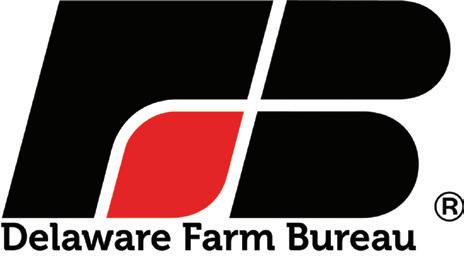

Farm Bureau News
Celebrating 76 Years!
Local Farmers Feeding Your Family
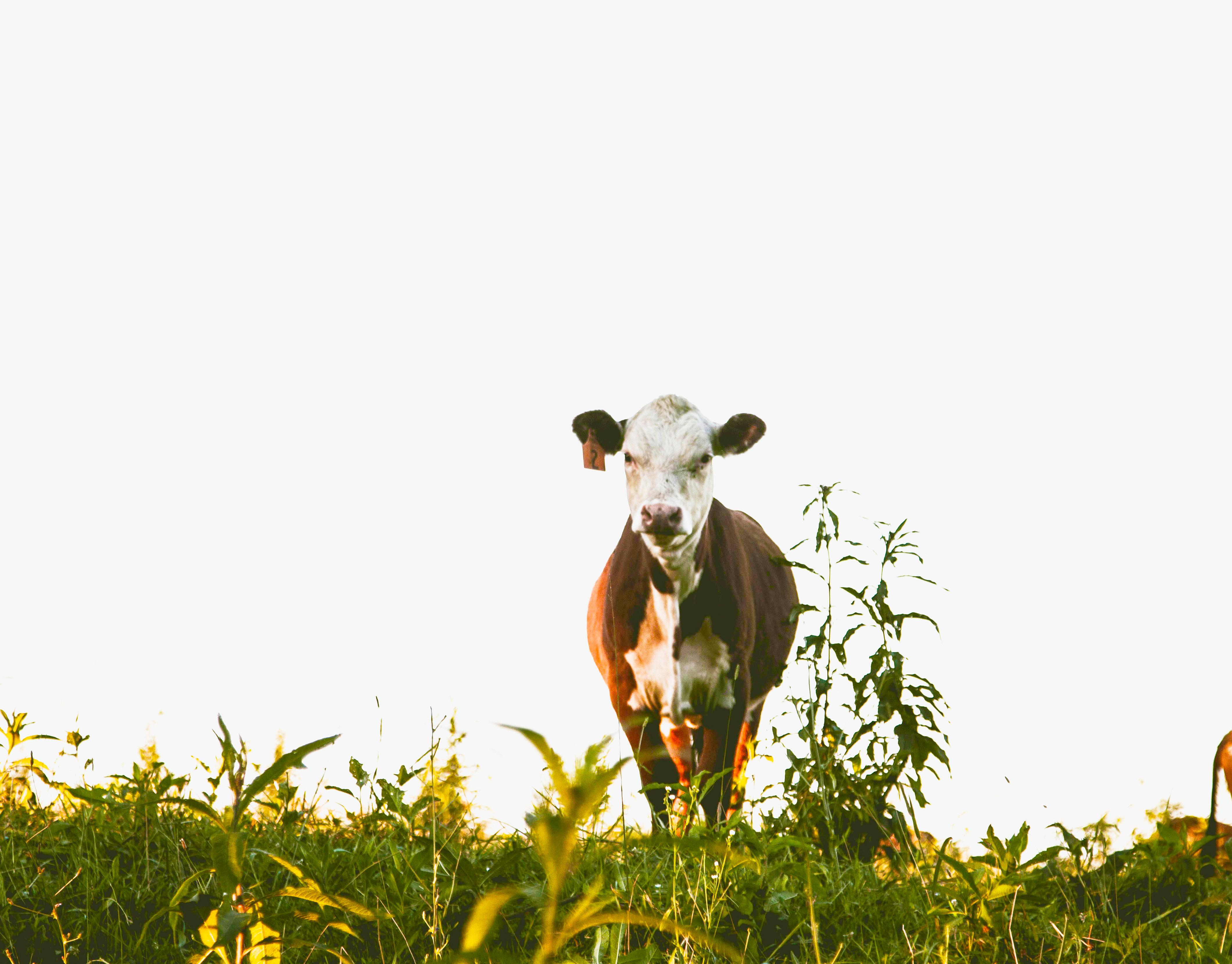
Solar panel use postively impacts environment, farming operations
Rural Road Safety brochure updated
Members advocate for improved USPS service Update to “FV” tags in Delaware

From the President’s desk
New season leads to planting advocacy, crops
As we head into planting season for many crops well-known to Delaware farmers, we are keenly aware that some things continue to be different this year.
The emergency of the pandemic has come and gone as the positive COVID numbers touted by state officials continue to go down. More and more people are getting a COVID vaccination and businesses are slowly opening their doors to more customers. Schools are working toward reopening to all of their students and trying to figure out how to work graduation ceremonies. Farmers like myself are starting to plant the crops of the new season. As with each new season - we need to be prepared for anything life throws at us.
Although grain and soybean farmers are currently experiencing a long awaited upward trend in commodity prices, this could mean lower revenues than expected over the next year for the end users of those commodities. Other farmers may incur difficulties in securing their usual workforce because of issues with VISAs, traveling and labor returning to work. Many of you may be experiencing challenges with getting the materials and supplies needed and may be seeing price inflation. In any case, we are far better prepared for the emergency of a pandemic this year than we were last year. Not only
Delaware Farm Bureau News
Editor
Jennifer Antonik jenn.antonik@defb.org
Delaware Farm Bureau News (ISSN 10770798), published in Camden, DE, bimonthly, by Delaware Farm Bureau. Production by Delaware Printing Company. Periodicals postage paid at Camden, DE and additional offices.
Business and Editorial Offices:
3457 S. DuPont Highway, Camden, DE 19934, 302-697-3183.
Any editorial material may be reproduced with credit to this publication.
POSTMASTER: Send address changes to Delaware Farm Bureau News at the office above. Subscription
that, but we, as a nationwide grassroots- based organization, have a better grasp on what we might need to focus our advocacy efforts on during this time.
AFBF Pres-

ident Zippy Duvall commented in a recent blog post that consumers have “. . .gained a greater understanding and appreciation of where their food comes from.” This tells me that we are doing well in supporting our farmers and our consumers. Feeding our communities is at the heart of our businesses. It brings me joy knowing that we have done well by both of these groups.
He added, “. . . Trust in farmers and ranchers increased, by 4%, even after consumers faced empty shelves and long food bank lines and heard the heartbreaking stories of farmers being forced to dump products that couldn’t be packaged and shipped due to supply chain breakdowns. . . . We didn’t give up, we gave back.”
There is power in that thinking. Farmers stood tall during this crisis. We leaned into each other, we stuck together and when we had problems, we reached out.
Delaware Farm Bureau members made a splash, for example, when they reached out to U.S. Senator Chris Coons, D-Del., about problems delivering chicks and poults with the postal service. Not only did he read some of their comments by name on the Senate floor, but local media picked up the news, too. Our members were heard in Washington, D.C., as well as local outlets such as WBOC, WDEL, the Cape Gazette and the Delaware State News. Delaware Farm Bureau also worked with Sen. Coons and Carper on the bipartisan Senate “Chicken Caucus” to secure funds for contract poultry farmers that were financially impacted in the early days of the pandemic last March and April.
These are examples of how the Delaware Farm Bureau works together throughout the year as a team to address current issues and make an impact for farmers, ranchers, and consumers in the First State.
Maintaining an open line of com-
munication with legislators like Sen. Coons and Carper and Rep. Blunt Rochester is very important to an organization such as ours.
We have the same open lines of communication with many of our local legislators and try to engage them throughout the year through this newspaper and events like our legislative roundtables with our Legislative Committee.
This year's legislative roundtable was, of course, held virtually. The Legislative Committee had a chance to discuss farm-related issues with legislators from across the state.
The legislative committee sponsored a roundtables for each county during the first week of March. Each session discussed state issues as well as respective county issues.
Under my leadership, the Delaware Farm Bureau has formed a Livestock Processing Advisory Council this year. We know that USDA inspected livestock processing is a highly complex issue that affects Delaware livestock producers and livestock producers in surrounding counties of Maryland, New Jersey, and Pennsylvania. We know that current capacity is inadequate to meet potential demand for locally raised animal protein. We are working with the Delaware Department of Agriculture and others to secure funding and approvals to increase the capacity of value added livestock processing to enhance the food and agriculture supply chain and food resiliency.
Looking forward, I am hopeful that we will be able to get our membership together again for events such as our annual banquet or even the Delaware State Fair which is right around the corner. Our advocacy is as strong as our membership. We have met virtually for the past year, and I know I can't wait to see everyone in person again as I know many of you feel the same.
In the meantime, I am grateful in knowing that we can continue making an impact in spite of the confines of our pandemic. The Farm Bureau has not stopped working for you. We will continue reaping what we've sown together, and we will plant new seeds as the pandemic wraps up and we work toward normalcy again.
Stay healthy. Be Farm Bureau Proud.
State Board of Directors
President
Richard Wilkins
1st Vice President
Laura Hill
2nd Vice President
William Powers, Jr.
County Presidents
Kent: Jacob Urian
Sussex: Steve Breeding
New Castle: Stewart Ramsey
Young Farmers and Ranchers
State Chair: Mollie Lynch
Kent Chair: Michael Lynch
Women’s Committee
State Chair: Mary B. Gooden
Kent Chair: Rebecca Bobola
Sussex Chair: Constance Fox
New Castle Chair: June Unruh
Kent County Directors
Bruce Dempsey
David Marvel
Ted Bobola Jr.
Sussex County Directors
Alan Bailey
Mark Davis
New Castle County Directors
Bruce Patrick
Will Powers, III
Ryan Greer

Delaware Farm Bureau President Richard Wilkins
Rural Road Safety brochure updated for motorists, farmers
One of the most hazardous responsibilities a farmer has is traveling on roads with tractors and farm equipment.
As farm equipment has become wider and longer to improve efficiencies, and many Delaware farms are not contiguous, time spent on the roadways moving from field to field is always a concern.
Most farm equipment usually travels 25 miles per hour (mph) or less in areas where the speed limit may be posted at 10, 20 or 30 mph higher. The higher the motorist’s speed, the less reaction time available to slow down or pull off the roadway to allow farm equipment to pass.
According to the National Safety Council, roadway collisions that involve farm vehicles on US roads total more than 15,000 per year. More than 60% of these collisions involve the farm vehicle being hit from behind.
Still, collisions can also occur when the tractor and equipment operator tries to make left turns or by sideswipes. Most of these collisions occur in the daylight and on dry roads. Usually, when the fatality occurs, the victim is the tractor operator.
Delaware Farm Bureau and Nationwide have updated its Rural Road Safety brochure with helpful information for both motorists and farmers. The brochures are available at the Farm Bureau office, Farm Bureau County meetings, all Delaware Motor Vehicle locations and the Rest Center in Smyrna.
The brochure reminds motorists to:
• Be alert for agricultural equipment with Slow Moving Vehicle (SMV) emblems, reflectors, or flashing lights.
• Avoid a collision by slowing down immediately when you see agricultural equipment on the road with SMV emblems.
• Be careful when trying to pass equipment, as the operator may not see or hear you.
• Be patient. Do not pass the slow-moving equipment unless it is safe to do so.
• Pass with caution. The equipment may be longer and wider than you think.
• Be aware of possible lefthand turns into fields. Many
farm tractors often move to the right just before making a left turn.
The brochure reminds us, as farmers, to:
• Use SMV emblems to show that your equipment is traveling 25 mph or less. Check to make sure SMV emblems are clean and unfaded.
• If your towed equipment ob-
scures the SMV emblem or lights on your tractor, place SMV emblems and lights on your towed equipment.
• SMV emblems are placed with the triangle pointing up in the center of the vehicle, two to six feet above the road.
• Use flashers and turn signals to indicate your location and intentions.
• Use reflective extremity marking tape to show the size of farm equipment.
• Pull over and allow traffic to pass when it is safe to do so, and you can pull off the road entirely with your equipment.
• Use an escort vehicle if moving large equipment on the road.
• Minimize road travel during bad weather or rush hour.

Do your part!
Check the end gun on your irrigation system to ensure it is not spraying on the road, and make sure the end gun is turned off if there is a possibility it could spray onto the road.
your ad in the Delaware Farm Bureau News and reach nearly 4,000 members!
Contact the Delaware Farm Bureau at (302) 697-3183 or email the editor at jenn.antonik@defb.org for more information!


Members advocate for better USPS service
Late medications, bills never received and livestock dead on arrival are just a few of the consequences Delaware farmers have faced due to problems with the United States Postal Service over the last year.
Searching for answers, Delaware Farm Bureau members reached out to local and state legislators for help; Senator Chris Coons, D-Del., made sure their voices were heard this week from the Senate floor.
“Bill Powers, a former county councilman I know well from New Castle County, member of the Farm Bureau, is a long time turkey grower who now provides fresh eggs for local farmers markets. Bill’s experienced significant losses with turkey and chick deliveries and called my office with concerns,” he said while mentioning just a few of the thousands of constituent contacts he has had regarding this issue.
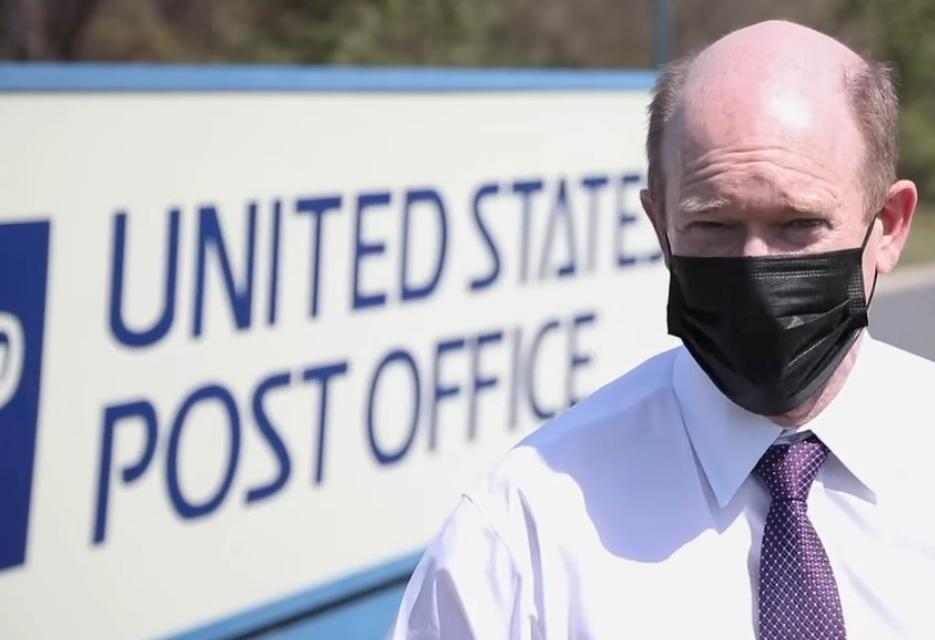
The Delaware Farm Bureau also sent a letter to Sen. Coons, Sen. Tom Carper and Rep. Lisa Blunt Rochester in January detailing some of the postal service concerns facing farmers.
dles a large volume of mail cheaply with a high degree of speed and accuracy. Many of us depend on it for paperwork, medications, orders, payments and, for farmers like me, seeds and day old chicks.
The post office has been shipping day old chicks to farms like mine,’ Trebs wrote, ‘for over 100 years. Today, all 20 baby hens arrived cold and lifeless. I cried as I opened the box. The postal supervisor cried. The gentleman who normally delivers my mail apologized profusely but it’s not his fault. Whatever one feels about mail in ballots or politics,’ she wrote, ‘I’m asking you to put this aside and do what you can to restore the postal service.’ Madame President, Trebs Thompson is right. No farmer should ever have to open a box of dead chicks.”

“Trebs wrote, ‘Largely our postal service has been a jewel. It han-
At the end of Coons’ speech to the Senate, he discussed a letter sent from another Farm Bureau Member, Trebs Thompson of Newark, an egg farmer with Whimsical Farms.
The Delaware Farm Bureau will continue to advocate for the needs of farmers and ranchers in the First State. For more information, please visit www.defb.org.
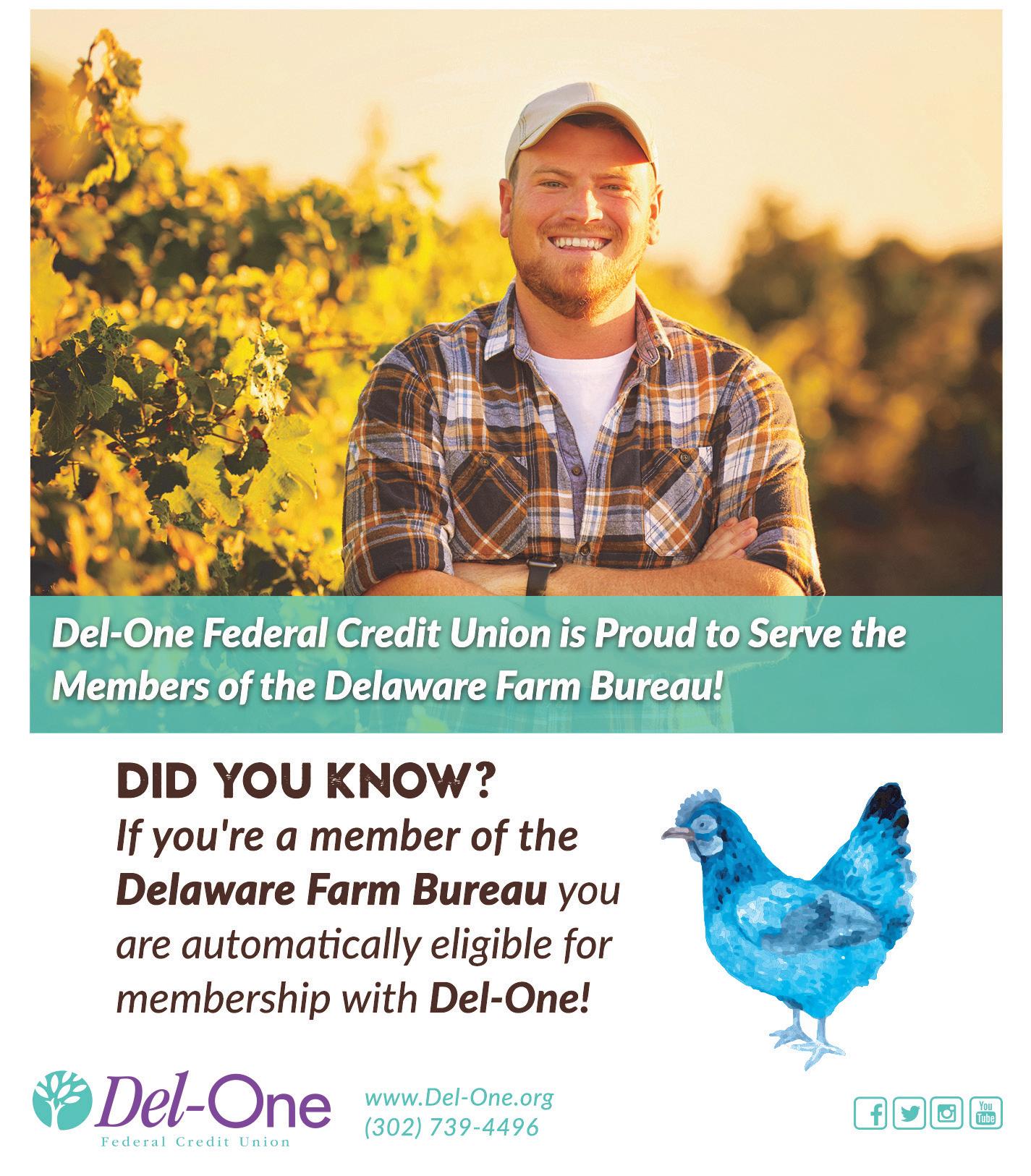
Image from Sen. Coons' Facebook page Senator Chris Coons speaks to constituents via a live video from the Bear, Delaware Post office.

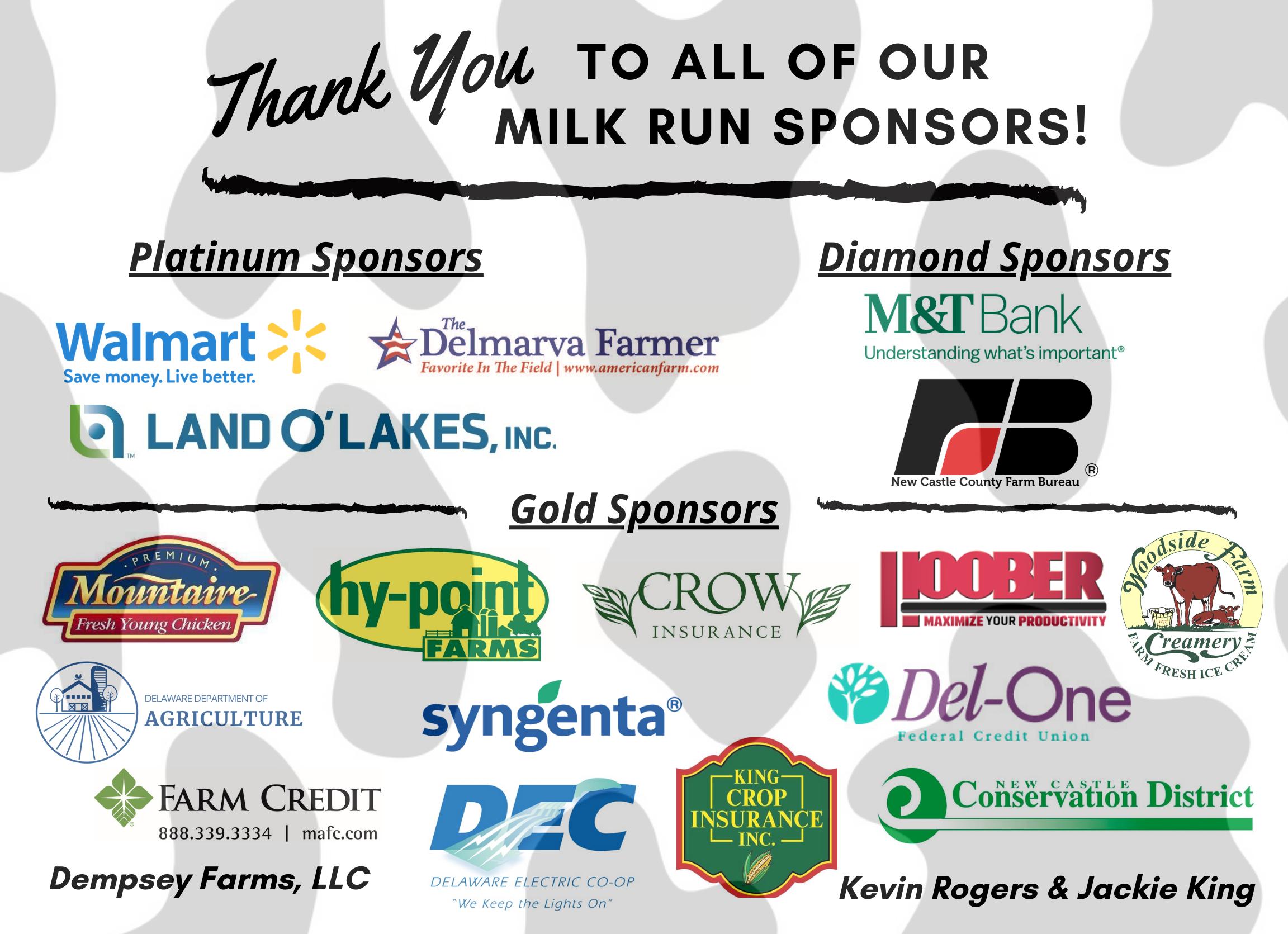

Farm Bureau provides update on Delaware issued 'FV' tags
Thanks to New Castle County Farm Bureau members who alerted the State Office that a registration change had been made when requesting a “FV” tag for a vehicle 55,000 pounds or over gross vehicle weight (GVW).
This change resulted in the Delaware Division of Motor Vehicles (DMV) requesting an IRS Heavy Highway Vehicle Use Tax ReturnForm 2290 be completed with the registration. The cost of submitting the Form 2290 online with a third-party provider was $40.00.
In the past two weeks, the Farm Bureau has been in contact with the Division of Delaware Motor Vehicles to determine why this change was made.
Books are donated to elementary schools in Delaware through the Book Barn program. Contact Mikayla Paul for more information at 302-697-3183.

Jana Simpler, the Director of the Division of Motor Vehicles and Valerie Carey, Chief of Vehicle Services both concurred that since the “FV” tag is a non-titled, registration for identification only tag, a vehicle does not need to submit IRS Form 2290 at registration.
Thanks to all the Farm Bureau members who contributed to background information and their experiences with the DMV using the “FV” and “FT” tag.
Note: the “FT” tag will still need to have a Heavy Highway Vehicle Use Tax Return – Form 2290 accompany its registration if the vehicle is 55,000 pounds or over GVW. However, there is an agricultural exemption on the Form 2290 if the vehicle is driven 7,500 miles or less in a year.
Please call the state Farm Bureau office with any questions at 302697-3183.
According to the DMV, a computer software change was made to request the Heavy Highway Vehicle Use Tax Return - Form 2290 be completed when any vehicle at 55,000 pounds or more GVW was registered. Unfortunately, the “FV” tag classification was included into this software upgrade.




P & E Committee details volunteer opportunities, upcoming events
By Debbie Kirk P& E Committee Chair
The Delaware Farm Bureau Promotion and Education committee strives to connect our neighbors with the farming community to promote understanding and appreciation for our most vital industry, Agriculture.
The mission of the P & E Committee states: The Delaware Farm Bureau Promotion and Education committee partners with Delaware farm families to create relationships with our neighbors, the consumer, to promote Delaware’s number one industry and educate the public and farmer alike.
Offering our communities the opportunity to engage with farmers and learn about the functions of a farm and the production methods used to bring their food from farm to table is critical to healthy living in our state.
Our community members cover a wide age range so our P & E team remains committed to edu-
cating all Delaware residents, even our youngest children that are just beginning to learn about the world around them.
We offer a variety of resources and activities throughout the year designed to promote Delaware Agriculture and support our local farm families.
"Read it and Eat"
Our P & E committee members work throughout the year to develop programs that offer opportunities for agricultural education and we are currently partnered with the DE Department of Agriculture through the “Read it and Eat” program.
The goal of this three year initiative is to place a barn shaped bookcase containing ag accurate books in every public elementary school in Delaware. Pre-pandemic, these “book barns” were delivered by Delaware Farm Bureau members and special guests and students were treated to storytime with one of our guest readers. These “book barns” are still being delivered,

along with the books to place inside, but the “live” reading opportunities have now become a video library that can be shared with schools and accessed in classrooms throughout the state.
We know that reaching our youngest citizens is so important as they will be the consumers of the future. If you know of an elementary school in your community that has not yet received their “book barn”, please contact Mikayla Paul at the Delaware Farm Bureau office (mikayla.paul@defb.org) to make arrangements for delivery.
Safety Initiative
Our safety initiative includes education for our neighbors, as well as education for our farmers and DE Farm Bureau members.
The annual Delaware Farm Bureau Safety Conference offers training for Farm Bureau members regarding safe equipment operation and chemical application as well as addressing critical needs in the industry like first aid and mental
wellness. The 2021 Safety conference in March was a virtual event attended by over 40 participants.
The Promotion & Education committee is looking forward to planning our 2022 event and growing this opportunity for farmers throughout our state.
Annual Photo Contest
The 2021 Delaware Farm Bureau Photo contest will launch on May 1st and our committee could not be more excited! Last year, we had a record number of photo submissions and look forward to even more this year.
Photo entries will be accepted online at www.defb.org between May 1st and October 31st and winners will be announced before the end of the year.
The top four photos from the 2020 event are now on display at the Delaware Agricultural Museum and the Delaware Farm Bureau office. Keep your cameras ready to capture Delaware Agriculture in action!
FARMERS
You value keeping the legacy of your farm. We value helping farmers like you. When you’re ready to discuss your options, contact our team.

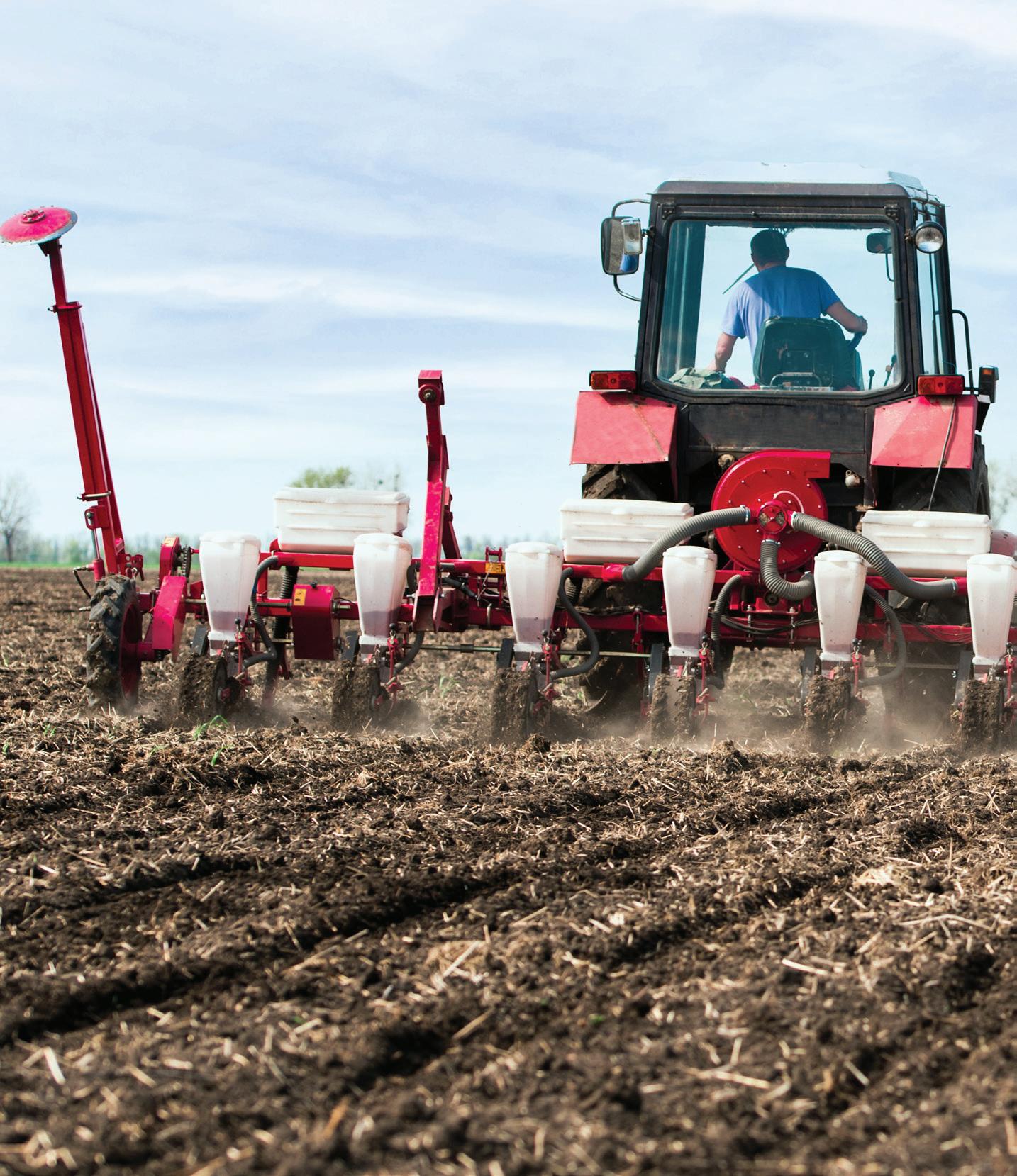
CATTLEVILLE

Can you find the items in the Cattleville cartoon made from cattle products? HintUse the check list of 32 items. Color the cattle in Cattleville when you finish.
Foundation completes peer review, looks to increase impact
By Kali Voshell Foundation Coordinator
The Delaware Farm Bureau Foundation Board approved a proposal from the American Farm Bureau Federation (AFBF) to conduct a Peer Review of the Foundation.
The American Farm Bureau Federation usually conducts Peer Reviews for State Farm Bureaus. This was the first Foundation Peer Review, and it was conducted virtually, another first.
The Peer Review team consisted of Margee Wolff, (AFBF) Vice President, for Leadership, Education, and Engagement; Daniel Meloy, the Executive Director of the American Farm Bureau Foundation for Agriculture; Charlene Shupp Epsenshade, Executive Director of the Pennsylvania Friends of Agriculture Foundation; and Ruth Meirick, Foundation Director at the Minnesota Farm Bureau. They began by reviewing sever-
al Foundation documents including publications, bylaws, financial statements, and Board reports, to better understand the operations of the Delaware Farm Bureau Foundation. This process started in early January 2021.
The Peer Review team conducted video interviews with 12 people associated with the Foundation. The team met with Foundation Chair Richard Wilkins, several other Board members, several county leaders, staff, donors to the Foundation, and others in the Delaware agriculture community.
The interviews occurred January 28 and 29 this year and the results were presented to the Foundation Board at a special Board meeting on Tuesday, March 16, 2021.
The Peer Review team divided the report into two categories, “Strengths” and “Key Issues to Address”. The team listed fifteen Strengths. I want to share three with you. First, the Peer Review team
found an excitement about the mission of the Foundation. They said that they were impressed with the passion that the interviewees had for the Foundation’s mission and people who were familiar with the Foundation’s work hold it in high regard. Second, the Peer Review team was pleased to learn that I, as Foundation Coordinator, am the State of Delaware representative to the National Ag in the Classroom organization. This representation brings credibility to the Foundation and provides access to tools that can strengthen our program. Third, the Peer Review team thought that the Foundation had “the bones” of a successful event with the 5K Milk Run/Walk. The team appreciated the way that agricultural awareness and education were weaved throughout the event, and that the event makes a profit to benefit the Foundation, the Ministry of Caring’s Milk Program for children, and the Food Bank of Delaware’s
backpack program which also provides milk for school children.
The Key Issues to Address were divided into Strategy and Focus, Role Clarity, Increasing Impact, and Fundraising. The Board has begun prioritizing the 47 suggestions in the review. The Peer Review team acknowledged that some of these suggestions can be achieved in the short term of a year or two, some in the long term of several years, and others might not fit the Foundation.
I will keep our Farm Bureau members up to date on recommended improvements in future Foundation columns.
If you would like to volunteer your time to the Foundation, we are always looking for readers in our mobile Ag Lab. It is a chance to read an accurate ag book and to interact with elementary school students. The students love meeting and speaking with farmers. Please call me if you have an interest, 302697-3183.
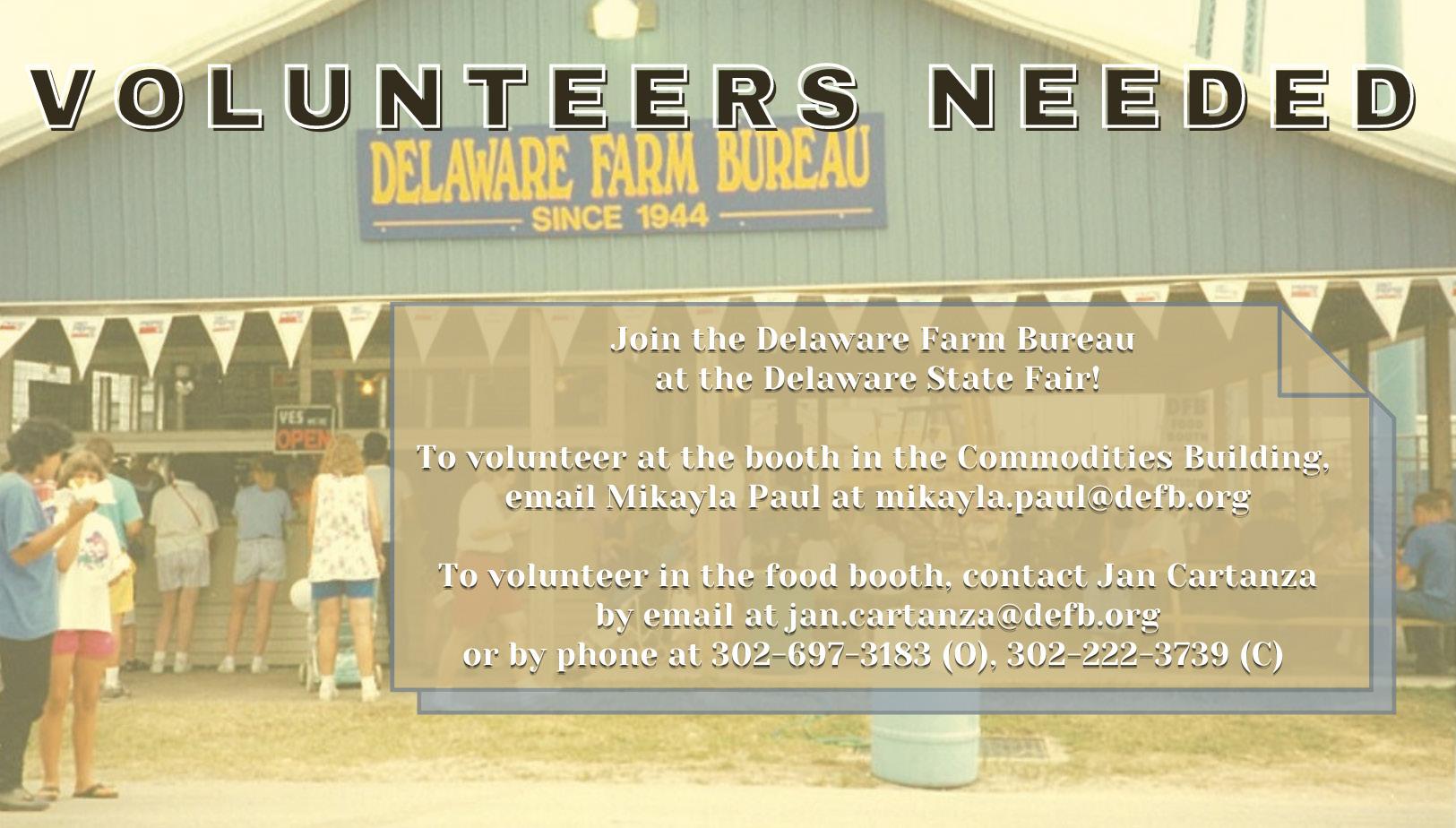

FORD RANGER
By Jennifer Antonik
Meet Your Farmer: Peter Seely
A historical marker now highlights a past not forgotten at a small farm in New Castle County, Delaware. For Peter Seely, the significance is as large as the farm once was when it was first established in 1726.
“We think it’s awesome. My grandmother was thrilled that I decided to move down here and try to fix it up. When some University of Delaware students made an entire report on the property, they said it was really important to the area and so we started the [historical marker] process,” he said.
The Cox-Phillips-Mitchell agricultural complex, as it is now known, was established in 1726 when “William and Catherine Cox built a Flemish bond brick house named ‘Ocasson’ on 350-acres of land acquired from Letitia Penn,” according to the marker.
The farming property then changed hands several times over the span of decades. All owners have been Quakers, Seely added.
The marker goes on to tell the tale in short order: “William Phillips and his heirs owned the farm from 1766-1830 and added a bank barn by 1770. From 1830-1856, Quaker farmer and abolitionist Jacob Heald owned the property. Farmer and businessman John Mitchell acquired the farm in 1868 and expanded the barn for dairy operations. Mitchell’s heirs retained ownership of a portion of the farmstead into the 21st century. The property reflects changes in agricultural practices over nearly 300 years.”
Placed on the property in September 2020, the marker has since been highlighted by local news organizations and historians as another piece of the puzzle. Some have even hinted at the farm as a reason Hockessin got its name.
“When Ocasson was first established. . ., it was before engines, electricity, and tractors, so the farming life was very difficult and everything was done by hand. So to collect animal feed meant taking corn and husking each ear by hand and tossing them into the corn crib. Hay and wheat would be manually harvested with a scythe. The farm would have had many types of animals and basically just supported the family or very local neighbors and was not done for profit, but for survival,” he explained.
Heald, a farmer and abolitionist,
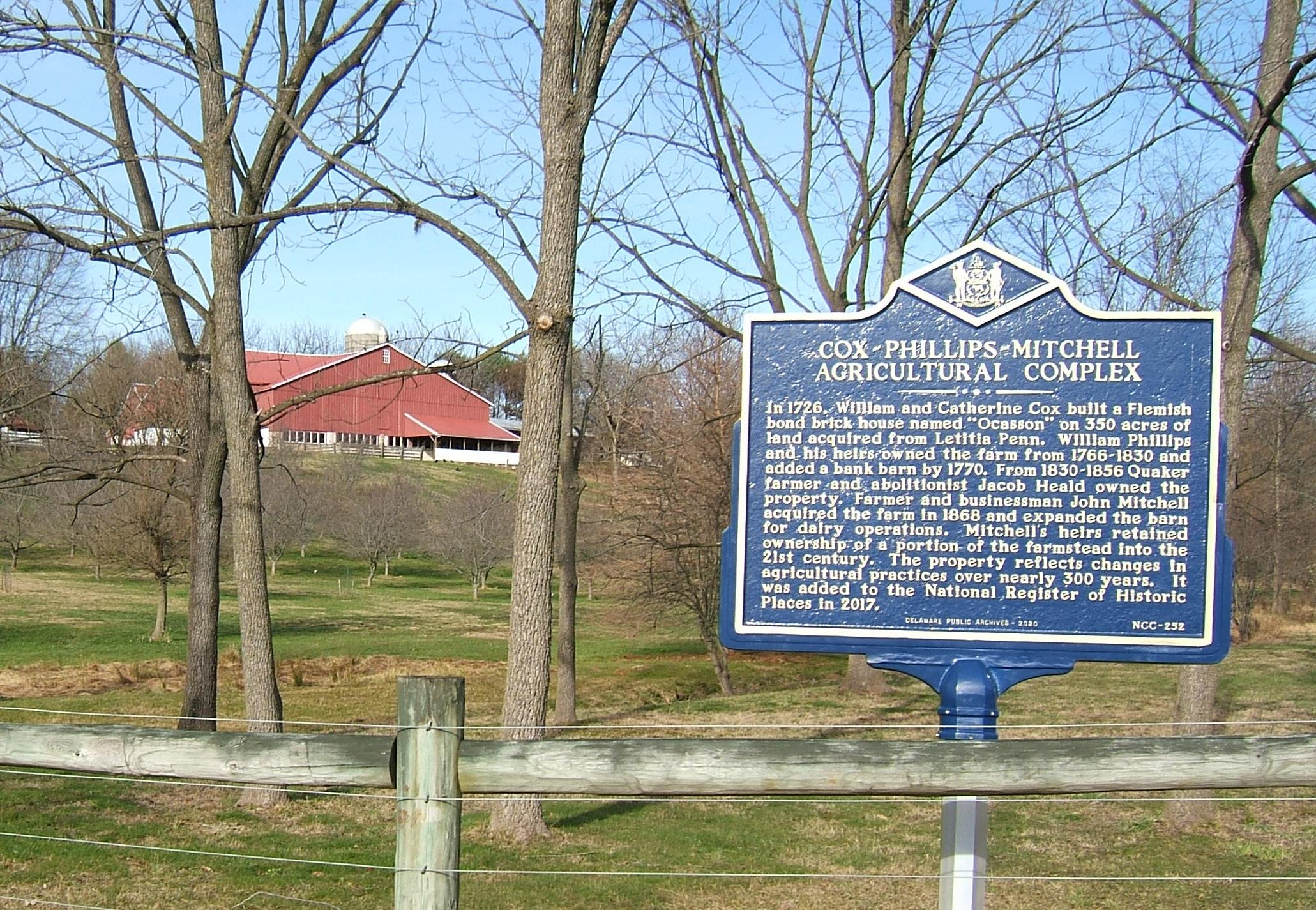
may have added a special feature to the property — an Underground Railroad stop. This was especially helpful for those seeking shelter as the farm straddled the Pennsylvania and Delaware borders. Seely is researching this aspect of the farm in hopes of adding it to the National Underground Railroad Network to Freedom.
The Mitchell’s were next and, as of now, last in line for ownership. When they took over the farm in 1868, they created a successful dairy farm called Green Lawn Farm. At the time, technology was advancing and the steam train in Hockessin was soon constructed, allowing farmers to expand their customer base, according to Seely, who is a Mitchell descendent.
Other advancements were eventually created, such as silos and water pumps, which aided the farming operation in a way that allowed the occupants to expand their customer base more.
Over the next century, the Mitchell family associated with the Ocasson property moved away from the
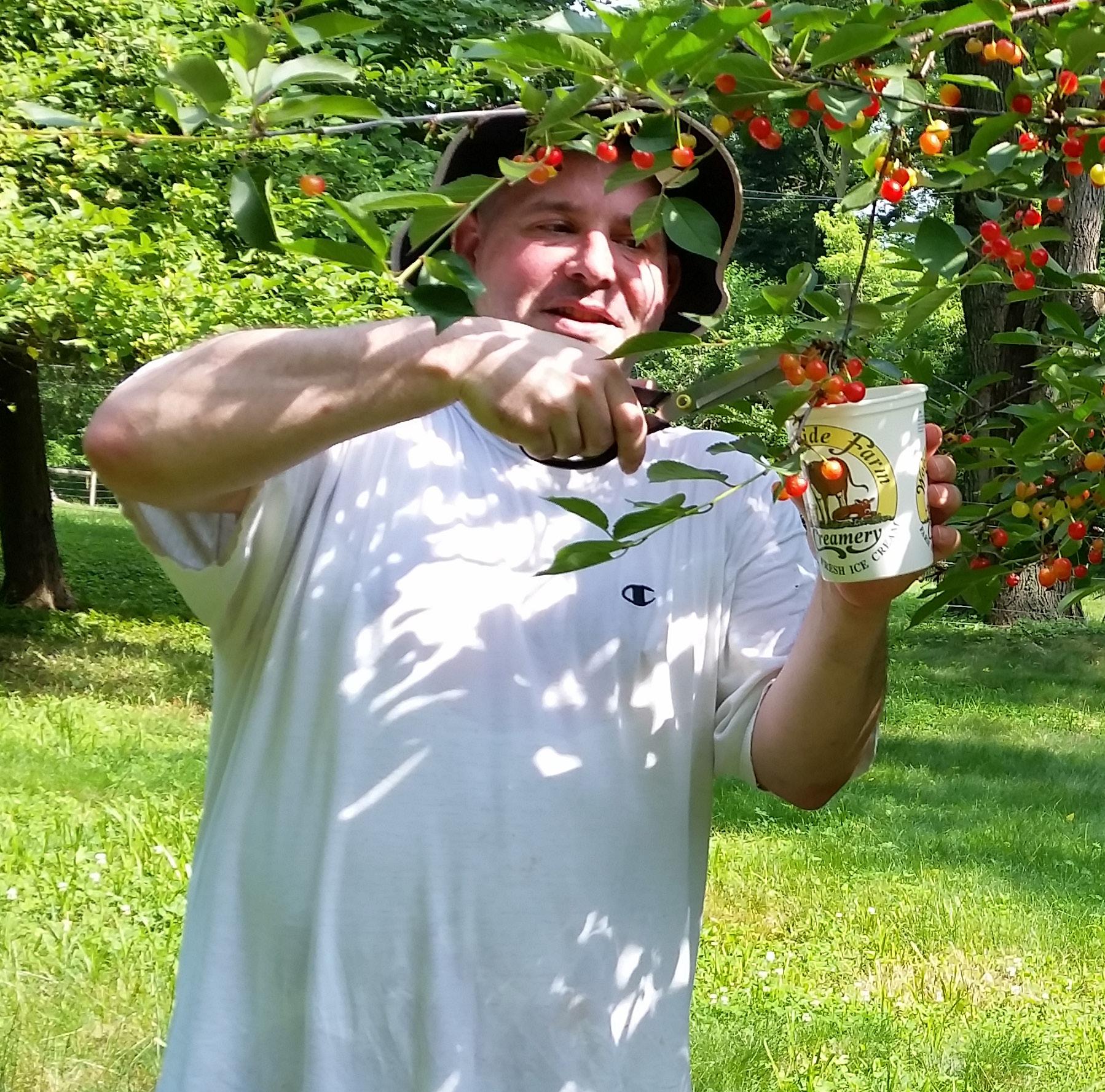
The Cox-Phillips-Mitchell Agricultural Complex in Hockessin, Delaware, received a historical marker during the Pandemic thanks to University of Delaware students interested in preserving history.
Peter Seely, a Mitchell family descendant, clips sour cherries off a tree on his 300-year-old family farm.
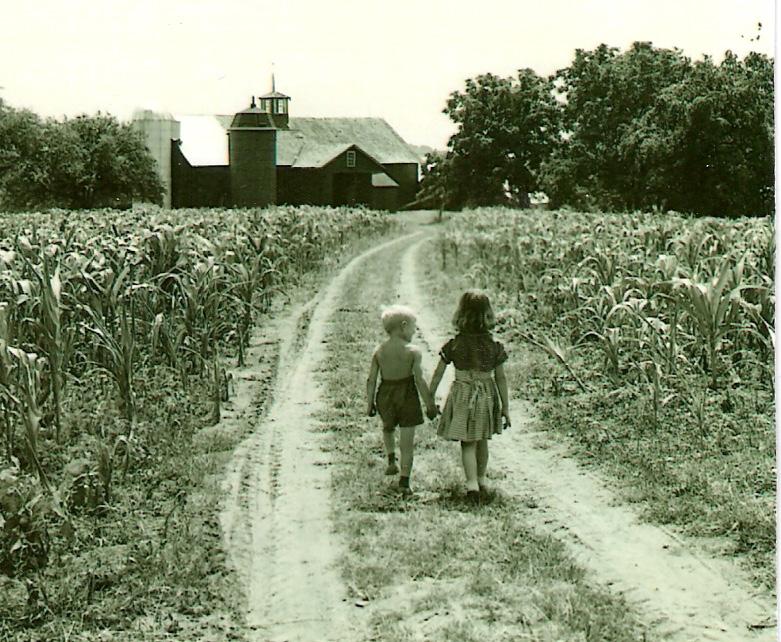
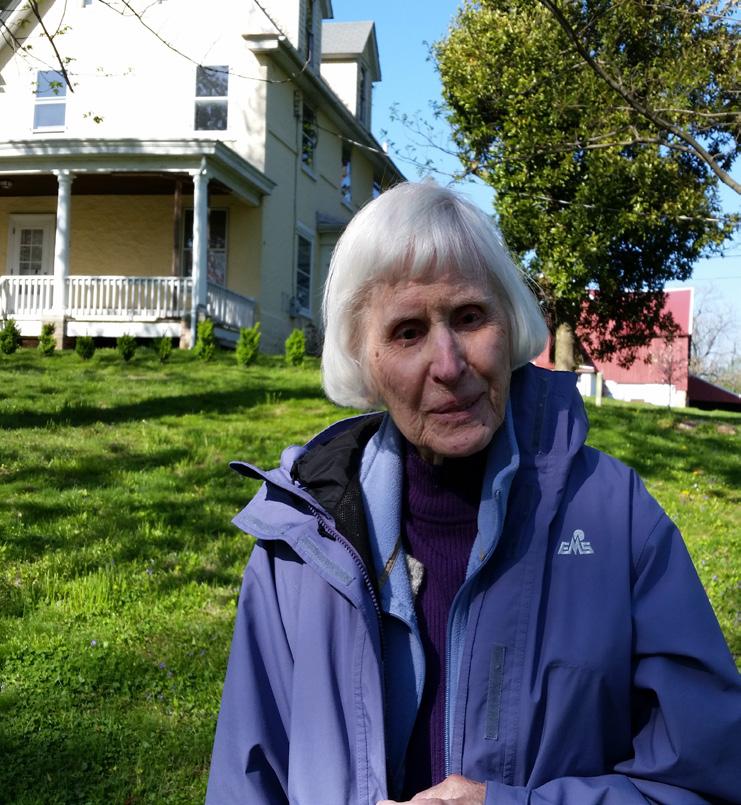
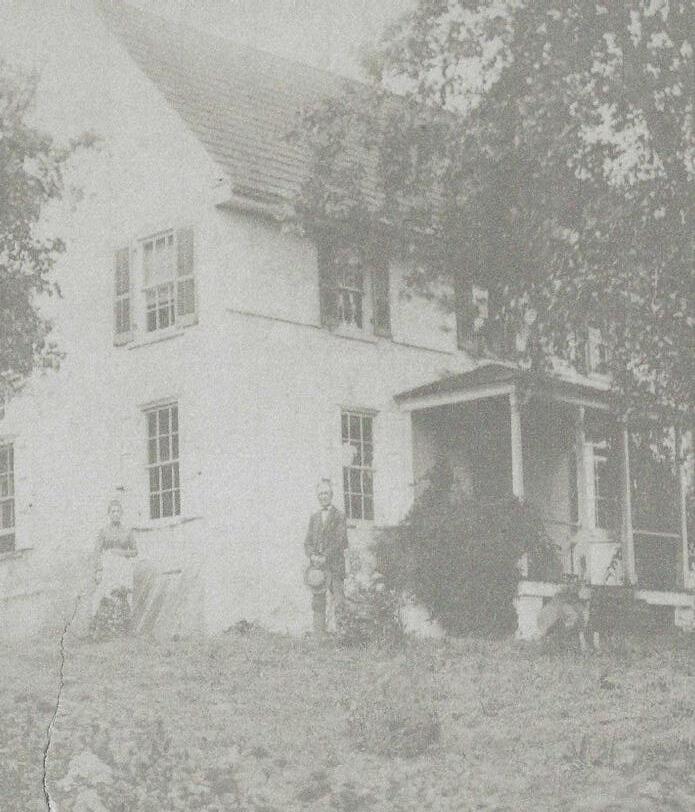
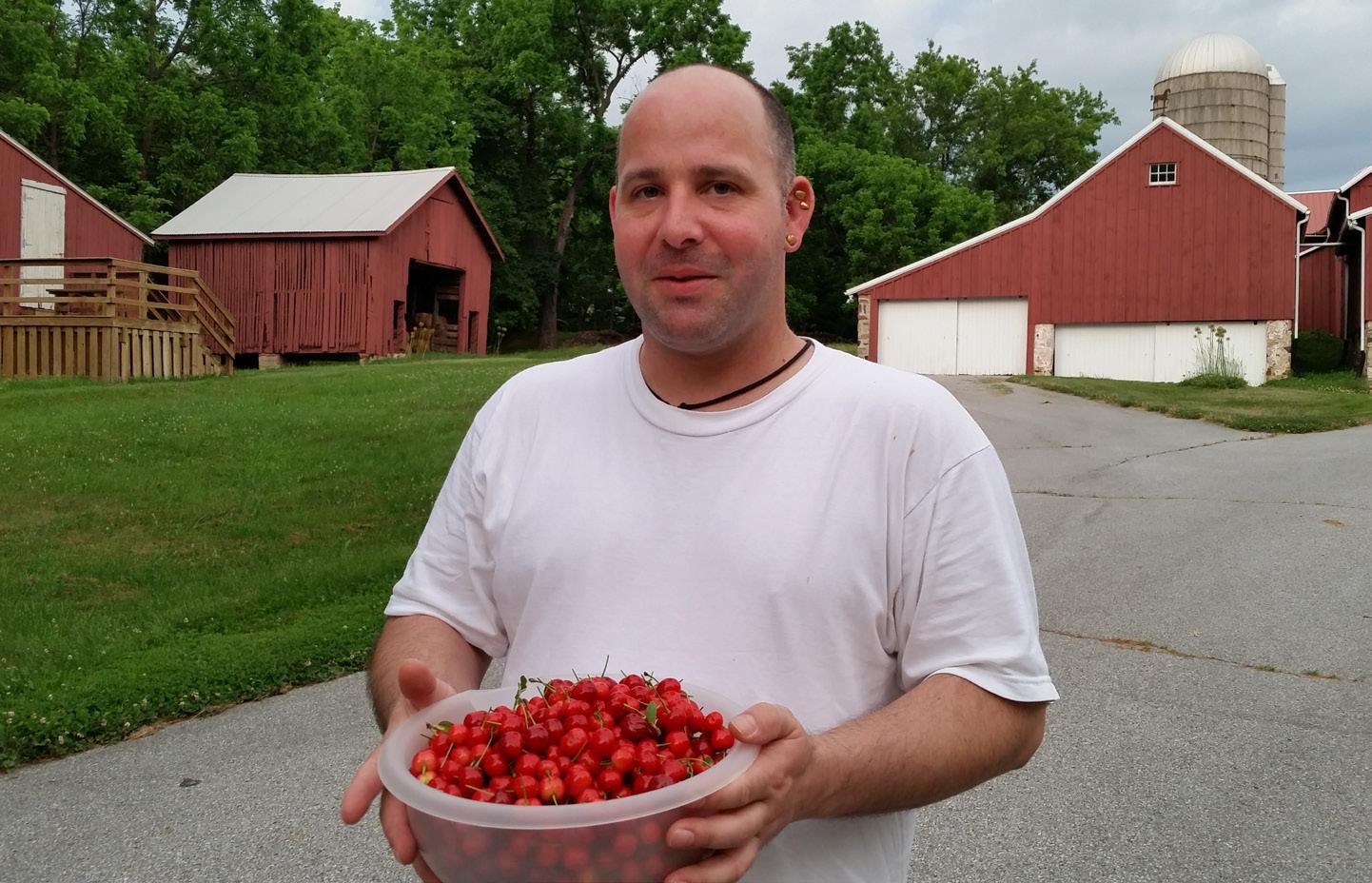
farming life and opted to lease out much of the farmland. In the 1980s, most of the land was sold during a housing boom. The family chose to retain ownership of the historic farm buildings and 8.5 acres of the grounds surrounding them.
“I grew up in a suburb of Philadelphia and only visited this farm a few times as a child. I attended Villanova University and then went on to work at a company close to my home. As my grandmother was getting older, she kept asking anyone in the family if they would be interested in the property and nobody was. I felt like it was too much to lose. So I quit my job, purchased the property, and moved down to the farm to try to bring the farming back to life on the little acreage that remains,” Seely said.
He purchased a tractor, learned how to operate it safely and now has about 80 apple trees, 40 blueberry bushes, sour cherry trees and Paw Paw trees.
“There are many challenges be-
sides the size of the property. There is a very steep slope and many neighbors close to the property. I wanted to respect their privacy, also. Many properties like this have been turned into wineries and I was thinking about going that route but decided to try growing fruit trees and blueberry bushes. I am growing everything completely organically at this point. I am not using any chemicals at all. The blueberry bushes have been very productive. The apple trees, not so much. And the sour cherry trees provide a decent harvest. I make jam with the blueberries and my mother makes apple sauce and pies with the apples,” he said.
Seely hopes to add other aspects of farming back to the property, too.
“Someone told me that in Delaware, if it was a farm, it can always be a farm. I hope that is true and that I can turn this place around and keep the almost 300 years of farming this property alive and be able to pass it on to future generations so it remains a farm forever,” he said.
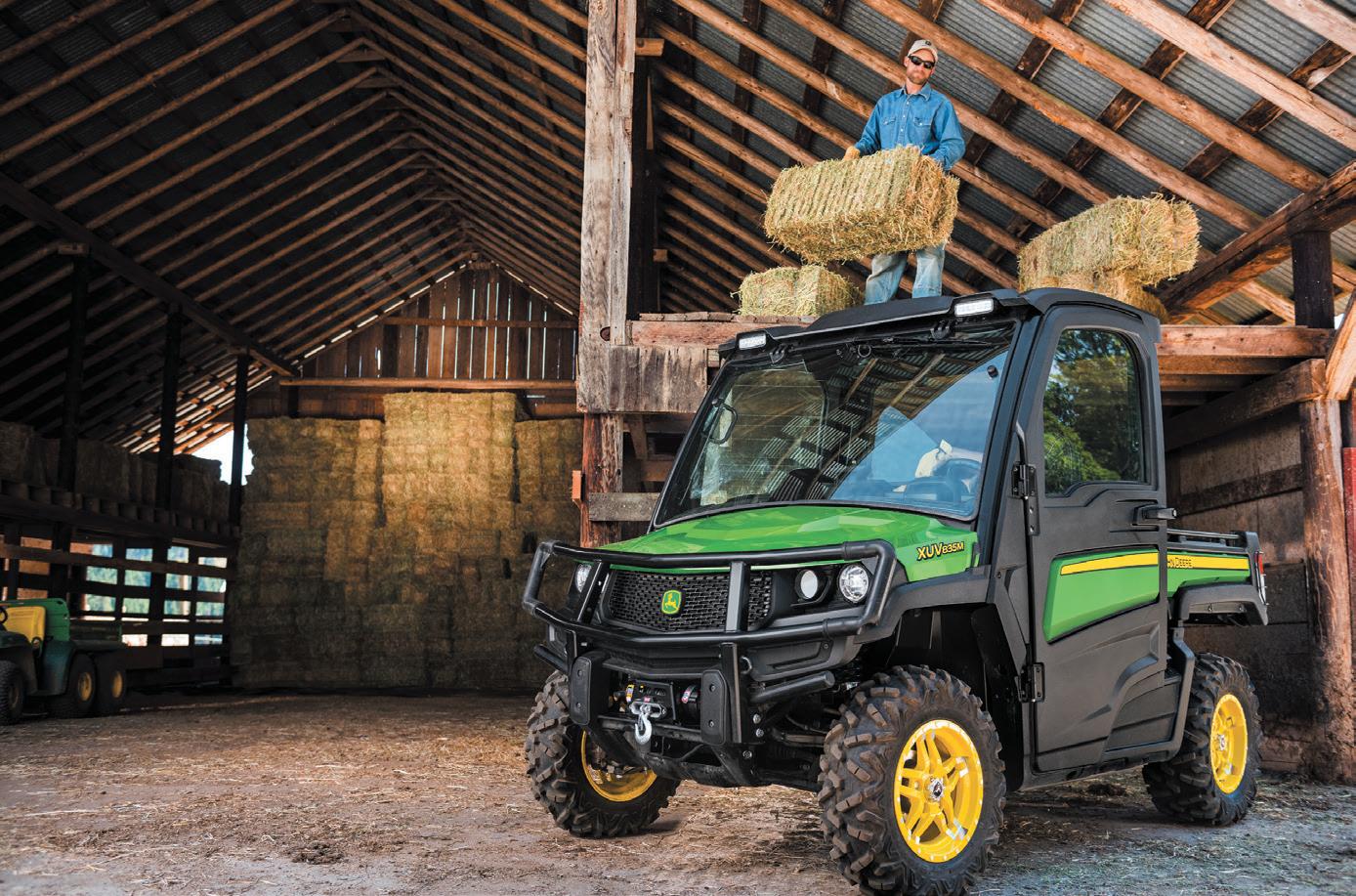
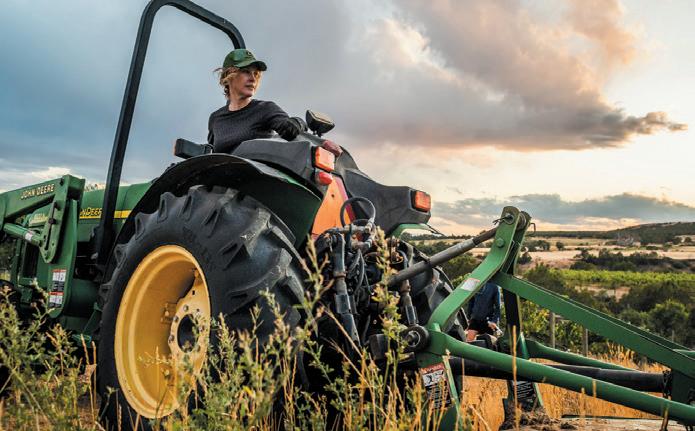
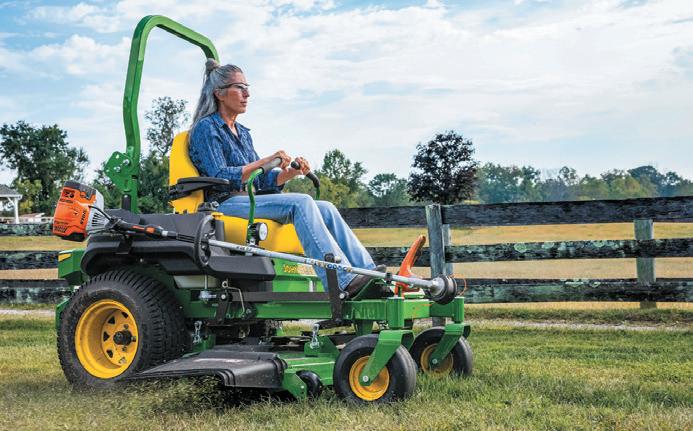

All photos provided by Peter Seely. Children of tenant farmers who lived on the property in the 1950s walk along a path on the farm. (Permission for use given to Seely from Ken Proud)
To the left: Peter Seely's grandmother stands in the front yard of the family home. The home, as it stood 1870 shortly after the Mitchell family purchased the property, can be seen in the photo next to the right
remain on the 300-year old property in Hockessin.
Farm Bureau members discuss benefits of solar panel use on farms
By Jennifer Antonik
Some farmers are giving back in more ways than one with a little help from Delaware’s sun, benefiting goals set forth in Senate Bill 33 signed by Governor John Carney Wednesday, Feb. 10 this year.
An earlier piece of legislation required 25% of Delaware’s energy use to come from renewable sources by 2025. The more recent legislation, sponsored by Senator Stephanie Hansen and Representative Ed Osienski, increased that amount along with the timeframe offered. Now, 40% of the energy used in Delaware must derive from renewable sources.
“Delaware is the country’s lowest-lying state, and climate change is already having a very real impact,” Gov. Carney said. “This legislation will help accelerate Delaware’s transition to renewable sources of energy, which is good for our economy and our environment, and I’m pleased to sign it into law.”
Solar panels are just one way Delaware farmers are improving the outcome of goals such as those discussed in Senate Bill 33.
According to Delaware Farm Bureau member Katharine Parry of Hartly, solar panels have not only enhanced her family’s poultry farming practice, but it has helped the environment and other electricity customers, as well.
“Financially wise, it certainly has saved us a lot,” she said. “And of course, we do want to be good stewards of the land. This is a great way to do that.”
Parry had a 274-kW solar panel system installed in 2019 through Paradise Solar, consisting of 832 panels.
The system, albeit costly upfront, has helped pay down the balance on its own merit, she added. Parry said Paradise Solar helped the farm operation find all of the financing options, including loans and grants before installation began.
The family also discussed options with the electric company.
“During the summer months, it was very easy for us to come up with a $6,000 to $7,000 electric bill. Our summer months are still the highest, of course, but now our bill does not go above $600 a month. Sometimes, it’s as low as $17. On really great months, we get a check from the electricity company because we produced more electricity
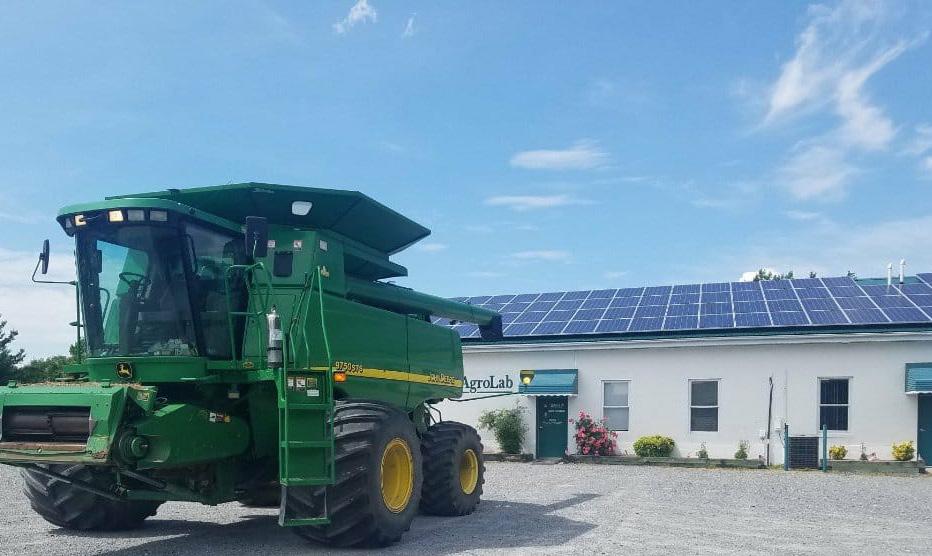
with the solar panels than we use on the farm,” she explained.
Another benefit keeps the Parry’s on the solar panel path, too, she added.
“Environmentally, this definitely helps to offset our carbon footprint. We have organic chickens through Perdue. They love to go out in the pasture areas. . . Since we are organic, we have two audits per year, including the organic audit. The solar panels are always a big conversation piece when they come,” Parry said.
Fellow Farm Bureau member and Sussex County Director Willis Kirk lauded solar panel use on farms as just one-way farmers help their local communities.
“A fair number of farmers have installed solar panels; many of them have broiler [poultry] farms,” he said. “It does work as a means of conserving energy.”
His family has farms spread throughout the state; several have solar panel systems already installed and working to improve their operations.
“These systems even take care of the electric bill. When it comes to solar, we’re looking at it in a positive sense and seeing what’s going on. Farmers are looking out for our communities. Conservation is just one way we do that.”
Bill Rohrer of Agrolab switched to solar panels several years ago when considering how much electricity his business utilizes.
“I was very frustrated with the grid system, not only the cost but the demand of electricity from my own business,” he said. “When you’re spending $2,000-3,000 a month, you scratch your head and wonder, wow, can we do something differently?”
For Rohrer and Agrolab, solar was the change they needed.
“We paid for the system within three to five years, which shows you how much electricity we use on the Agrolab property. The conservation topic is definitely what gets people interested in solar panels. But conservation and financials are interrelated. Farmers and people in the agricultural industry want to do
everything we can to improve the environment. And from the business side of it, it has to make good financial sense for the most part to jump into a project like solar panels. For many of us, it’s a great way to combine goals.”
Continuing, he added, “The way ag is advancing in technology, you have to make sound decisions. In my 30-year career in ag, I have noticed that farmers are making better and better decisions and are getting educated. I have always been a strong advocate of what farmers are doing. They are modest. And I have always said, ‘If you can make a living farming on the Delmarva Peninsula, you can make a living doing it anywhere.’ These farmers are giving it their all for their families, business, community, and the environment. I’m proud to be a part of the ag community and be around farmers.”
Visit the Delaware Farm Bureau online at defb.org. If you would like to add your solar story, contact Jenn Antonik at the Delaware Farm Bureau at jenn.antonik@defb.org.
Bill Rohrer of Agrolab in Harrington had solar panels installed at his business several years ago. The system paid for itself within three to five years, he said.
Nationwide Farm Certified agent: A trusted advisor for your farm operation
The following information is provided by Nationwide®, the #1 farm and ranch insurer in the U.S.*

The growing sophistication of today’s farmers and ranchers calls for a strong understanding of the challenges and risks inherent to 21stcentury agriculture. When you see an agent is On YourSide® Nationwide Farm Certified, you can rest assured he or she is a trusted advisor with the training and experience necessary to help you overcome those challenges now and well into the future.
A Nationwide Farm Certified agent knows agriculture, understands the evolving risk exposures on your operation — whether large or small — and can provide you peace of mind backed by the nation’s #1 farminsurer*. It starts with a unique three-tier training program that builds on every agent’s extensive experience in agriculture.
Three certification levels enhance agents’ ability to help farmers manage risk
Each level builds upon the previous level to expand youragent’s
knowledge and understanding of risks and exposures on the farmand the products and coverages offered by Nationwide. You can be confident that your local Farm Certified agent is well-prepared, for example, to help you know what to consider when expanding your farm operationand make sure your farm is not underinsured in the case of a loss.
On Your Side® Farm Review
Because farms are always changing, your Nationwide Farm Certified agent will want to conduct an annual review of your farm to build on his or her knowledge of your operation. “Certified agents know any changes a farmer makes can directly influence –sometimes greatly –the farmer’s risk exposure,” said Nationwide Agribusiness Sales Manager Marc Menninga.
A Farm Certified agent’s knowledge stretches beyond things like crops, facilities and machinery. “Certified agents know their cus-
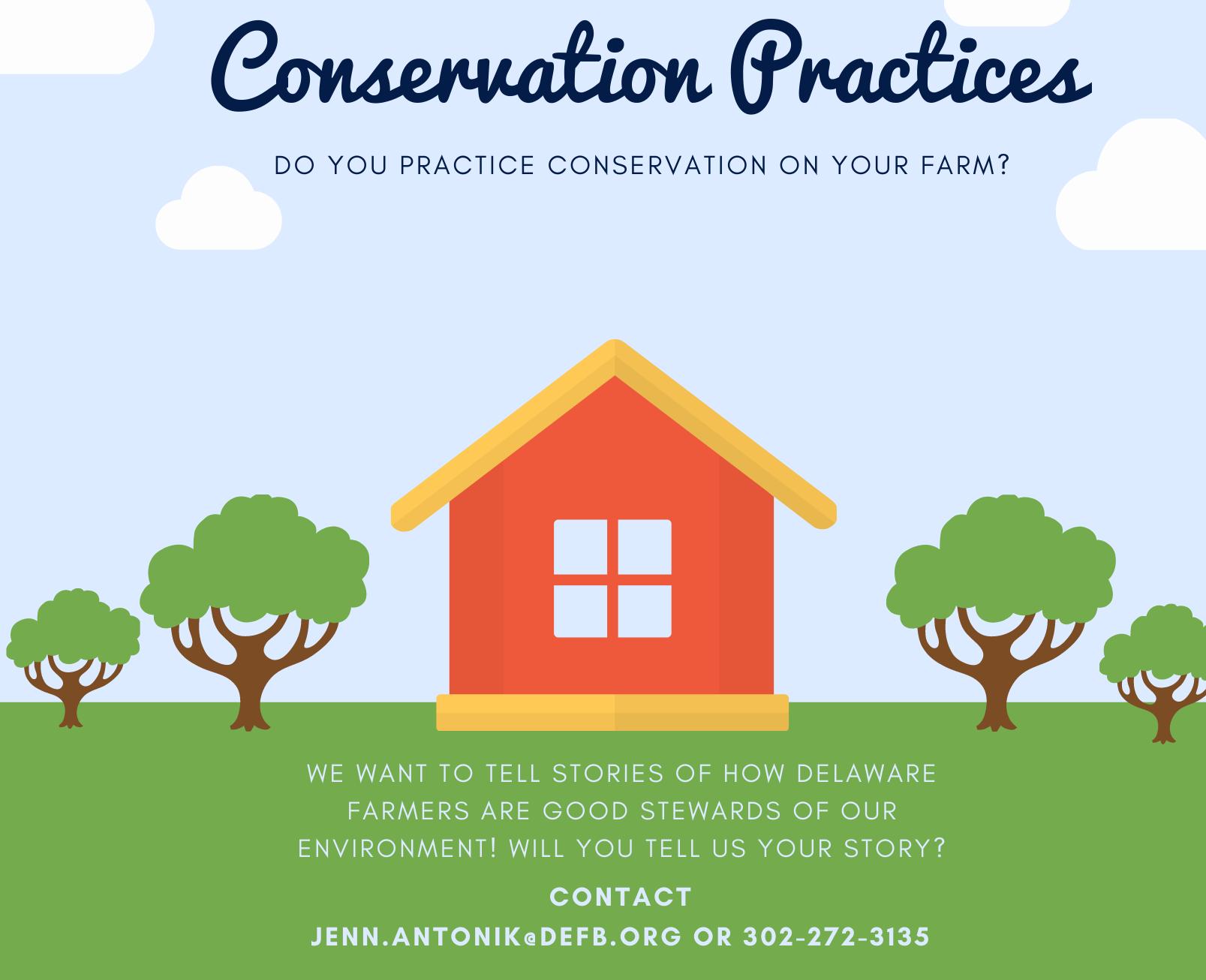
tomers and how to optimizetheir risk management strategies,” Menninga said.For example, some farmers are risk-tolerant while others are more risk-averse. Farm Certified agents understand this range of attitudes and how each customer approaches insurance based on his or her risk philosophy. It’s just one way Farm Certified agents apply a deeper understanding to ensure every customer is confident in his or her risk management.
Nationwide Agribusiness Vice President of Sales and Underwriting, Dirk Pollitt said it best, “Our agents are always striving to be trusted advisors for their customers, and the Farm Certification program is a crucially important piece of the solution. It provides our agents a platform to better understand our products and how they can benefit the farmers and ranchers they serve. Our Farm Certified agents can provide an elevated
level of expertise and service to their customers as a result of the insight and relationships they’ve gained from their involvement in the program. We continue to hear from our customers that these are the agents they want to do business with. At Nationwide, we exist to protect people, businesses and futures with extraordinary care and these Farm Certified Agents help us do that!”
Find a farm agent
By visiting www.farmagentfinder.comand entering your ZIP Code, you can find a Farm Certified agent nearest you. If you wish to have the agent contact you directly, you can request that by entering your contact information.
*A.M. Best Market Share Report 2019. Nationwide, the Nationwide N and Eagle, and Nationwide is on your side are service marks of Nationwide Mutual Insurance Company.© 2021 Nationwide.


